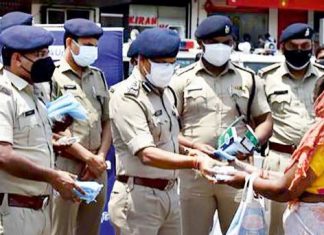Mumbai Police’s unique project ‘Police Didi’ aims at reducing cases of sexual harassment.
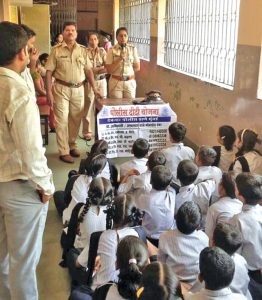 More than 50 girls and boys, aged between four and 14 screamed in unison in a hall in Chembur as cops looked on. The large screen in front had actor Aamir Khan talking to them about “three danger spots” that strangers can not be allowed to touch. “Once more, at your loudest,” said a police officer.
More than 50 girls and boys, aged between four and 14 screamed in unison in a hall in Chembur as cops looked on. The large screen in front had actor Aamir Khan talking to them about “three danger spots” that strangers can not be allowed to touch. “Once more, at your loudest,” said a police officer.
The children, mostly from a neighborhood slum, complied happily, all smiles at their deafening feat. “You must shout, inform your family or a police didi,” said the cop. The kids then ran out for snacks, but not before repeating what they had just learnt about “good touch, bad touch” at an innovative workshop conducted by the Mumbai Police in Zone VI. (Chembur).
It was a different, gentler face of the police on display. Their focus was to educate children directly about the dangers of child sexual abuse and they are doing it in a child friendly manner. The project is called, ‘Police Didi’- a first such proactive step in preventive policing to protect children in the city. “The police didi will only be a phone call away. Her numbers, including cell number, will be on stickers that each child gets to stick on his or her school bag,” said Sangram Nishandar, Deputy Police Commissioner (Zone VI Mahim) the brain behind the initiative.
Launched around two years ago in collaboration with few city-based NGOs to curb instances of child sexual abuse, it first began from Wadala, Govandi, Cheetah Camp, Deonar and Shivaji Nagar, all eastern suburbs, where such cases were rampant. The project engages women personnel from 93 police stations– constables and ASI level officers- across the city.
 The brutal rape, murder and mindless dumping of the body of a 12- year- old girl in Shivaji Nagar in 2014 triggered the initiative. Nishandar launched an awareness drive for kids along with help from women officers as well as assistance from NGOs ” to ensure that no child should suffer such horror again”. Sans publicity, his team covered over 23,500 children across 149 schools last year.
The brutal rape, murder and mindless dumping of the body of a 12- year- old girl in Shivaji Nagar in 2014 triggered the initiative. Nishandar launched an awareness drive for kids along with help from women officers as well as assistance from NGOs ” to ensure that no child should suffer such horror again”. Sans publicity, his team covered over 23,500 children across 149 schools last year.
Initial hiccups such as resistance from elite schools aside, the scheme has already attracted several success stories in the crime-prone areas of Chembur, Cheetah Camp, Nehru Nagar, Govandi and Tilak Nagar. In Chembur, a pre-teen got a molester, Shamlal Chavan, arrested in January, when even adults whom he used to harass had no courage to complain, said Archana Patil and Tabassum Magdum. “The child convinced her mother that the Police Didi must be informed about what the molester did,” the women cops said enthusiastically. The scheme’s success is set to expand as it will be implemented across the city.
Any initial misgiving about the “extra work” soon disappeared for the team of mostly police sub inspectors including Tejaswini Patil, Shobha Dhivre, Sarita Musale, Ashwini Khambe, Manisha Patil, among others. Manisha Shirke who conducted the training for other cops said, “We are teaching kids to be alert. They do not know that what is being done to them is wrong since, most often, it is acted upon by a known person or a familiar figure, like a watchman, driver or a domestic help. They do not know how to respond so we teach them how to respond when they are in such a situation. Little boys are equally vulnerable. It is our social responsibility to not just detect crime but to prevent it.”
The cops roped in child rights NGOs like Childline, Pratham, Sneha, Majlis and Koro for audio-visual aids including animated films as well as to engage and connect with the target audience. Over 1,000 female police officers reach out to women in slums to talk about their problems.
Assistant Sub Inspector Archana Patil is now known as ‘Didi’ by scores of women from the suburban Chembur slums who would otherwise hesitate to talk to men and women in uniform to share their problems. Like Patil, there are over 1,000 such ‘Police Didis’, who after their official work hours, reach out to young girls and women of all ages in slums.
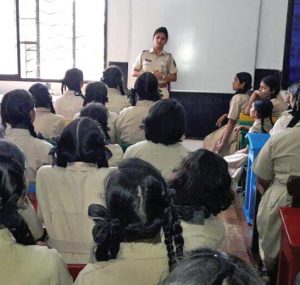 Under the project ‘Police Didi’, these female officers talk to the women and girls from the slums about the problems they face, especially those pertaining to sexual harassment. “Now, women living in slums are coming forward more frequently and confidently to share their problems, including that of sexual harassment. This has been made possible only because our trained women constables have established a rapport with them through regular meetings,” Deputy Commissioner (Operations), PRO, Mumbai Police, Ashok Dudhe said. Initially, 8-10 women personnel were short-listed from each police station and were given training on how to talk to women and young girls about sexual abuse.
Under the project ‘Police Didi’, these female officers talk to the women and girls from the slums about the problems they face, especially those pertaining to sexual harassment. “Now, women living in slums are coming forward more frequently and confidently to share their problems, including that of sexual harassment. This has been made possible only because our trained women constables have established a rapport with them through regular meetings,” Deputy Commissioner (Operations), PRO, Mumbai Police, Ashok Dudhe said. Initially, 8-10 women personnel were short-listed from each police station and were given training on how to talk to women and young girls about sexual abuse.
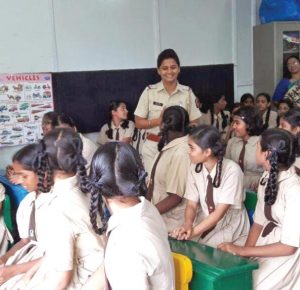 “After the training, they (women personnel) were asked to visit private and municipal schools under their respective jurisdiction, and conduct interactive sessions with girls. The girls were told about the difference between good and bad touch, by strangers, relatives or known persons within or outside school,” said Dudhe, who is also a Mumbai Police spokesperson. The Police ‘Didis’ also keep a close eye on activities of men in their respective areas, especially around schools.
“After the training, they (women personnel) were asked to visit private and municipal schools under their respective jurisdiction, and conduct interactive sessions with girls. The girls were told about the difference between good and bad touch, by strangers, relatives or known persons within or outside school,” said Dudhe, who is also a Mumbai Police spokesperson. The Police ‘Didis’ also keep a close eye on activities of men in their respective areas, especially around schools.
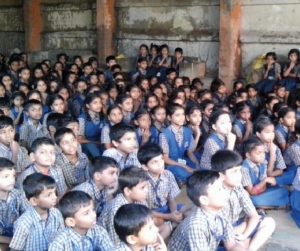 “In almost 90 percent of rape cases of minors, the rapist is a person known to the victim. Therefore, we are also alerting and sensitising girls as well as their mothers,” he said. Thanks to the project, cases lodged under Protection of Children from Sexual Offences (POCSO) Act have significantly come down.
“In almost 90 percent of rape cases of minors, the rapist is a person known to the victim. Therefore, we are also alerting and sensitising girls as well as their mothers,” he said. Thanks to the project, cases lodged under Protection of Children from Sexual Offences (POCSO) Act have significantly come down.
“We visit schools, particularly municipal-run schools and show them audio-video clips. We tell them the purpose of the screening the video. We also explain the same to their parents,” added Patil.
– by Nitesh Poojari




